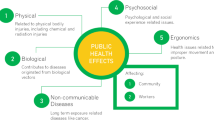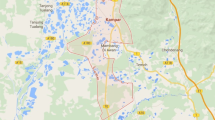Abstract
With the aim being to have an integrated and efficient management system, Malaysia is currently facing a remarkable waste issue with a massive increase in waste generated per day. This study collected 400 survey responses to assess the satisfaction and awareness of households about various issues of solid waste management. This study revealed that the majority of the respondents were satisfied with their waste management services. However, there was concern about providing a more diverse waste management facility. This study found a strong positive relationship between age and waste reduction behaviours. The majority of the respondents agreed that their lifestyle affected waste minimisation. Almost half of the respondents indicated that they lacked knowledge to practise waste sorting. Age and education were positively correlated to reuse and recycling behaviours. Overall, a holistic waste management education is vital for Malaysia to build an efficient waste management system.
Similar content being viewed by others
References
Alexis, M. T., & James, R. M. (2009). Sustainable recycling of municipal solid waste in developing countries. Waste Management, 29(2), 915–923.
Andrzej, M., & Arkadiusz, M. K. (2012). The problem of preparation the food packaging waste for recycling in Poland. Resources, Conservation and Recycling, 69, 10–16.
Asian Productivity Organization. (2007). Solid waste management: Issues and challenges in Asia. In Report of the APO survey on solid-waste management 2004–05. Tokyo: Asian Productivity Organization.
Borneo Post Online. (2013). Solid waste exceeds projected production in 2020. Resource document. Borneo Post Online. http://www.theborneopost.com/2013/08/27/2012-solid-waste-exceeds-projected-production-in-2020/. Accessed August 27, 2013.
Dongsu, K., Sunghye, S., Seungman, S., Jinshik, C., & Bongchan, B. (2002). Waste plastics as supplemental fuel in the blast furnace process: improving combustion efficiencies. Journal of Hazardous Materials, B94, 213–222.
Emery, A. D., Griffiths, A. J., & Williams, K. P. (2003). An in depth study of the effects of socio-economic conditions on household waste recycling practices. Waste Management and Research, 21(3), 180–190.
Johari, A., Saeed, I. A., Haslenda, H., Habib, A., & Mat, R. (2012). Economic and environmental benefits of landfill gas from municipal solid waste in Malaysia. Renewable and Sustainable Energy Reviews, 16, 2907–2912.
Joseph, K. (2006). Stakeholder participation for sustainable waste management. Habitat International, 30, 863–871.
Meneses, G. D., & Palacio, A. B. (2005). Recycling behavior: a multidimensional approach. Environment and Behavior, 37(6), 837–860.
Ngoc, U. N., & Schnitzer, H. (2009). Sustainable solutions for solid waste management in Southeast Asian countries. Waste Management, 29, 1982–1995.
Pek, C. K., & Jamal, O. (2011). A choice experiment analysis for solid waste disposal option: A case study in Malaysia. Journal of Environmental Management, 92(11), 2993–3001.
Rafia, A., & Muhammad, M. M. (2011). Using a contingent valuation approach for improved solid waste management facility: Evidence from Kuala Lumpur, Malaysia. Waste Management, 31(4), 800–808.
Saphores, J. D. M., Nixon, H., Ogunseitan, O. A., & Shapiro, A. A. (2006). Household willingness to recycle electronic waste: an application to California. Environment and Behavior, 38(2), 183–208.
Scott, D. (1999). Equal opportunity unequal results: determinants of household recycling intensity. Environment and Behavior, 31(2), 267–290.
Shahjahan, H. B. (2010). A crisis in governance: Urban solid waste management in Bangladesh. Habitat International, 34(1), 125–133.
Shigeru, M. (2011). Waste separation at home: Are Japanese municipal curbside recycling policies efficient? Resources, Conservation and Recycling, 55(3), 325–334.
The Star Online. (2010). New landfill site needed. Resource document. The Star Online. http://www.thestar.com.my/story/?file=%2F2010%2F2%2F2%2Fnation%2F5591952&sec=nation. Accessed February 2, 2010.
Zia, H., & Devadas, V. (2008). Urban solid waste management in Kanpur: Opportunities and Perspectives. Habitat International, 32(1), 58–73.
Acknowledgement
This study was funded by Special Funding for Social Science Research by Multimedia University Malaysia under Grant [IP20110321001]. The authors would like take this opportunity to thank all the research assistants in data collection and the anonymous respondents that responded to the questionnaire.
Author information
Authors and Affiliations
Corresponding author
Rights and permissions
About this article
Cite this article
Choon, SW., Tan, SH. & Chong, LL. The perception of households about solid waste management issues in Malaysia. Environ Dev Sustain 19, 1685–1700 (2017). https://doi.org/10.1007/s10668-016-9821-8
Received:
Accepted:
Published:
Issue Date:
DOI: https://doi.org/10.1007/s10668-016-9821-8




